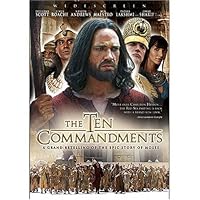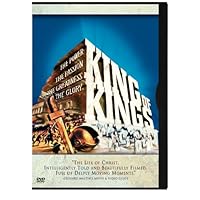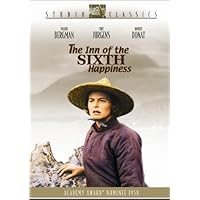
Average Reviews:

(More customer reviews)In terms of adjusted box office, Cecile B. DeMille's 1956 film "The Ten Commandments" is the fifth biggest grossing movie of all time, ahead of "Titanic," but behind "Gone With the Wind," "Star Wars," "The Sound of Music," and "E.T." There was a sense in which that film, with the parting of the Red Sea sequence, was the first big special effects film. Of course, the story of how Moses led the Hebrews out of Egypt had more going for it and that story is certainly worthy of further examination. Yes, "Prince of Egypt" was a musical, but it also focused more on the relationship between Moses and Ramses, who were friends growing up, rather than the rivalry we saw between Charlton Heston and Yul Brynner. Now we have this 2006 mini-series. The good news is that it does try to tell us a different part of the story in its second half, but the bad news is for every step forward there are steps backwards, and on balance this version does not come out ahead.
The mini-series aired in two parts, with the end of Part 1 being the parting of the Red Sea (not a real cliffhanger). The first part moves through the story of Moses from the night he floated down the Nile in basket to that moment in front of the Red Sea at a fast clip. Moses (Dougray Scott) grows up, kills an overseer, goes off into the desert, saves Jethro's sheep and marries his daughter, sees the burning bush and is back in Egypt telling Ramses (Paul Rhys) to let the Hebrews go. The plagues of Egypt come quickly as well, and there is a clear suggestion of how the frogs, locust, etc., were related to the Nile turning to blood. This Moses is not raised alongside Ramses, but Menerith (Naveen Andrews), the natural son of the princess, and they are the brothers who are torn and who face each other at the edge of the Red Sea. Moses has enlisted his brother Aaron (Linus Roache) to speak for him, and this version deals more with the reluctance and doubts of Moses, more so as the leader than as the deliverer of the Hebrews out of bondage.
This is little in the first half of "The Ten Commandments" to justify having made the mini-series. The only things that stood out where the idea that God wants Moses to work out some things in his own mind and the scene where Moses is forced to work as a slave, which this time is after he returns to Egypt. What is important in the first part is the idea that even before their deliverance, the Hebrews challenge the leadership of Moses. However, after the conclusion of the parting of the Red Sea the rest of the second half is devoted to the period in which the Hebrews wandered in the desert before reaching the Promised Land. This is where this version of "The Ten Commandments" starts to tell a different story, for a lot happens in the hour between the Red Sea and the Golden Calf. There is manna in the wilderness and turning the slaves into an army. Above all this there is the need for Moses the Deliver to become Moses the Law Giver. However, the impetus for this transition comes from a melodramatic irony that smacks of soap opera more than scripture.
Time and time again I question what Ron Hutchinson, who won an Emmy in 1989 for writing "Murderers Among Us: The Simon Wiesenthal Story," is doing in this story. At one point Moses is training the army and Joshua (Karim Salah) refuses because he sees being a solider as an admission of not having faith in God. Moses then tells what must be the oldest story of how God helps people; certainly it is an older version of the one Karl Malden tells to Jed Bartlett on "The West Wing." The relevance of the story to the point being made is lost because we cannot believe Moses is telling this story. However, this is a Moses who is not a cool and commanding presence. His doubts and lack of resolve are arguably the biggest reasons why the people doubt God; they have problems believing in his messenger.
I have always been bothered by the Hebrews challenging the idea that their God WAS God during the Exodus. What happened at the Red Sea should prove the point once and for all. The manna in the desert and Moses smiting a rock to bring forth water might be "minor" miracles, but they are nothing to scoff at and reminders of everything God did to get them out of bondage. Being freaked because Moses has gone up on the mountain and you think he is not coming back is one thing, but making the Golden Calf is a really bad idea. Hutchinson sticks to the book of Exodus and covers the slaughter by the sons of Levi that was the bloody aftermath of the great sin the people sinned.
This becomes the final act before the denouement where Moses sees the Promised Land but is not allowed to cross over. Hutchinson does play with Biblical chronology, because the battles they fought are covered in Numbers. However, my final complaint is not about chronology but rather that the story essentially ends with the slaying of the three thousand men, and not as Exodus does with the construction of the tabernacle and the ark, symbolizing the renewal of the covenant, which I find to be the more important part of the story. I would have preferred seeing this version of "The Ten Commandments" be restricted to what happened after they crossed the Red Seas; after all, the Hebrews forget the evidence of the power of God. The other half of the min-series could have covered the history of Numbers and Deuteronomy, the part of the Exodus that remains to be told in such a format.
Click Here to see more reviews about: The Ten Commandments
The Ten Commandments unfolds with all of the spectacle, violent human drama, and grand inspiration that have earned it its distinction as the greatest story ever told. When an oracle prophesizes that a child will become Prince of Egypt, a time of danger approaches the kingdom. The Egyptian Pharaoh orders the massacre of all newborn males. But one child, Moses--the son of a Hebrew slave--escapes certain death when he is set adrift on the Nile. As years pass, he is raised in a royal Egyptian household and, with no memory of his family, rises to the stature of prince. Upon discovery of his true heritage, and inspired by a fiery message from God, Mosesembarks upon a noble and desperate fight to reclaim his destiny as the leader and liberator of the Hebrew people. With a stellar cast that includes Mia Maestro and Golden Globe winner Omar Sharif, The Ten Commandments is unsurpassed in its vision--both intimate and grand. DVD Features include: The Making of "The Ten Commandments", Closed Captioning.





